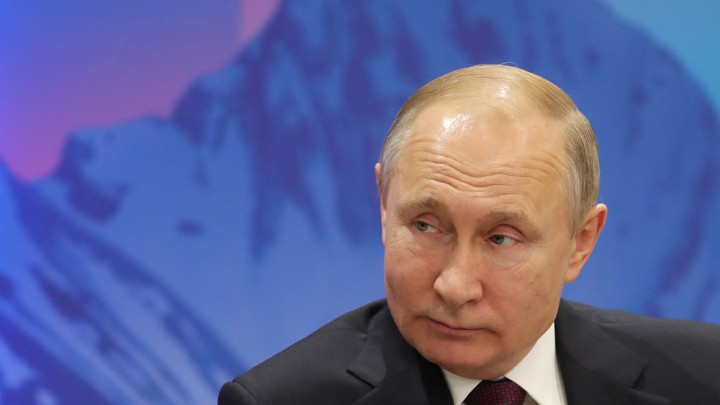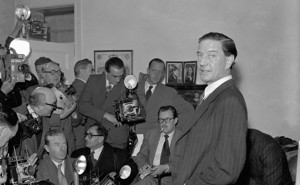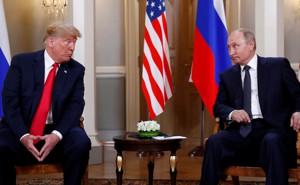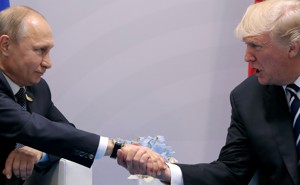You are using an out of date browser. It may not display this or other websites correctly.
You should upgrade or use an alternative browser.
You should upgrade or use an alternative browser.
RUSSIA/РОССИЯ THREAD—ASSANGE CHRGD W/ SPYING—DJT IMPEACHED TWICE-US TREASURY SANCTS KILIMNIK AS RUSSIAN AGNT
- Thread starter ☑︎#VoteDemocrat
- Start date
More options
Who Replied?The Russia Investigation Will Continue
Counterintelligence agencies must find it hard to believe the cupboard is already bare.
John SipherMay 4, 2019
Retired 28-year veteran of the CIA’s National Clandestine Service

Sputnik Photo Agency via Reuters
Although Special Counsel Robert Mueller’s Russia probe is over, and although President Trump on Friday again described the probe as a “Witch Hunt,” the FBI is almost certain to continue its counterintelligence investigation into Russian espionage efforts related to the 2016 election. More important, they will continue to search for Americans working on behalf of the Kremlin.
The inability to establish that the Trump campaign conspired in a “tacit or express” agreement with the Russian government is not surprising. Most espionage investigations come up empty unless and until they get a lucky break. That does not mean there was no espionage activity in relation to the 2016 election. Every previous Russian political-warfare campaign was built on human spies. Russian “active measures”—propaganda, information warfare, cyberattacks, disinformation, use of forgeries, spreading conspiracies and rumors, funding extremist groups and deception operations—rely on human actors to support and inform their success. Counterintelligence professionals must doubt that Russia could have pulled off its election-interference effort without the support of spies burrowed into U.S. society or institutions.
David Frum: Mueller helped Trump keep his most important secrets

Indeed, troubling patterns, unanswered questions, and tantalizing leads suggest that Russia relied on human sources to interfere in the 2016 election. Both the Mueller report and Intelligence Community assessments have identified a variety of Russian actors involved in the attack. They uncovered the activities of the Russian GRU, cyberhackers, and the Russian troll factory. However, one key player is missing: Russia’s premier espionage service, the SVR. Is it possible that the Russian espionage service played no role in Russia’s operation, and had no spies helping support what the Mueller report characterized as a “sweeping and systematic” attack of American institutions? The FBI would be professionally negligent if it assumed so.
Consequently, there is still much to uncover—and America’s intelligence services will work to uncover it. For example, how did the Kremlin know where to aim its disinformation effort? How did it know which communities to target, in which counties and states? One can argue that the Russians had a better sense of where to deploy their resources than did the Clinton campaign. Why did Trump and those around him consistently parrot Russian talking points? Why was the campaign so intent on disregarding expert advice on Russian issues? The Mueller report notes that while investigators couldn’t prove a conspiracy, some people nonetheless displayed conspiratorial behavior (destroying communications, engaging in a cover-up, and obstructing the work of investigators). The FBI, which has the benefit of secret intelligence, is certainly aware that it has only scratched the surface of Russian activities in 2016. Cyberhacks, troll farms, and the use of WikiLeaks are hardly cutting-edge espionage tradecraft. The Russian efforts that have been revealed to date were poorly hidden and displayed little professional elegance. Counterintelligence agencies must find it hard to believe the cupboard is already bare.
David Frum: A crack in Trump’s stonewalling
As Mueller pointed out, the Russians had a dedicated and extensive program to damage the U.S. polity. They sent numerous representatives to contact willing Trump representatives, looking for potential sources, access points to influence policy, and means to disseminate Russian talking points. Russian intelligence officers, like their American counterparts, would seek to establish as many contacts as possible and push as far as the market would bear in order to develop new sources. In the CIA, where I worked for 28 years, we used the analogy of a traffic light. A field officer pursuing a potential source would press forward slowly, assessing the target’s reaction to increasingly provocative and conspiratorial requests. As long as we received a “green light” in response, we would push the relationship further in the direction of our goal. If we hit a “yellow light,” we would reassess and try a different tack. We would stop only when we hit a firm “red light.” From the Mueller report, we now know that those around Trump were consistently flashing green.
A number of commentators have focused on the bumbling nature of those in and around the Trump campaign, concluding that their ignorance and naïveté militate against their ability to engage in a conspiracy. This is a misunderstanding of how the espionage game works. Intelligence services recruit plenty of gullible people. The responsibility for recruiting, training, exploiting, and protecting a clandestine operation lies on the side of the professional intelligence service: The spy service must translate the target’s potential willingness into a productive and secure relationship; the professional intelligence officer must slowly manipulate the relationship in an increasingly conspiratorial and secret direction, then help rationalize it for the target. The Cold War was littered with Kremlin spies the West failed to uncover in a timely manner because Western agents assumed they were too obvious, absurd, drunk, dim-witted, or low-level. Naive and ignorant people can get in too deep when manipulated by professionals.
Effective counterespionage is difficult and often unsatisfying, and takes time. Investigators are trying to uncover what a professional intelligence service is hiding, and success usually requires our own sources deep inside the enemy camp. As the saying goes, “It takes a mole to catch a mole.” Rarely can investigators and specialists develop enough evidence to uncover and indict spies without leads from overseas intelligence collectors, as the “evidence” is locked away in the files of the SVR. Unlike criminal investigations that close down when they are unable to prove that a crime has been committed, counterintelligence investigations can continue for years.
Benjamin Wittes: The catastrophic performance of Bill Barr
Likewise, counterintelligence professionals know that criminal prosecution is rarely the best tool for neutralizing the enemy. Even when investigators and intelligence officers are confident they’ve uncovered a spy, it is not a given that the person will be prosecuted. Hundreds of Americans spied for the Soviet Union during World War II and the Cold War, and only a small handful were ever brought to trial. The government’s methods of uncovering spies and its need to protect its sources limit its ability to produce convictions.
To some, it may seem unfair that investigators would not drop their efforts even after Mueller concluded that he could not “establish that the Trump campaign coordinated with the Russian government in its election interference.” Trump clearly thinks he’s been vindicated; he spoke to Russian President Vladimir Putin on Friday and said on Twitter that they discussed the “Russia Hoax” in their “long and very good conversation.”
Nevertheless, counterintelligence professionals realize they don’t have the whole story and will continue to work behind the scenes, slowly uncovering the activity of hostile intelligence services. From experience, they understand that failure to prove Russian espionage does not mean it didn’t happen. While the notion of “innocent until proven guilty” is something Americans take as solemn truth, to the Russian intelligence services it is just another vulnerability worth exploiting.
We want to hear what you think about this article. Submit a letter to the editor or write to letters@theatlantic.com.
John Sipher is a retired 28-year veteran of the CIA’s National Clandestine Service. He served in the Senior Intelligence Service.
@88m3 @ADevilYouKhow @wire28 @dtownreppin214
@DonKnock @dza @wire28 @BigMoneyGrip @Dameon Farrow @re'up @Blackfyre @Cali_livin @NY's #1 Draft Pick
 Like you can’t be more guilty goodness
Like you can’t be more guilty goodness:ALERTRED:
Last edited:
:ALERTRED:


Hood Critic
The Power Circle
:ALERTRED:
CENTCOM deployments aren't that unusual, the administration is probably piggy backing like they do everything else to look tough.






